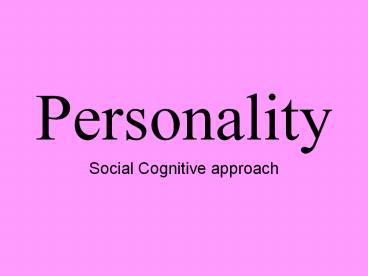Personality - PowerPoint PPT Presentation
Title:
Personality
Description:
Personality Social Cognitive approach Social Cognitive- Bandura understanding personality involves considering the situation and thoughts before, during, and after an ... – PowerPoint PPT presentation
Number of Views:663
Avg rating:3.0/5.0
Title: Personality
1
Personality
- Social Cognitive approach
2
Social Cognitive- Bandura
- understanding personality involves considering
the situation and thoughts before, during, and
after an event
3
Albert Bandura (1925- )
- People learn by observing and modeling others or
through reinforcement
4
Social-Cognitive Approach to Personality
- personalities are created by both internal and
environmental influences
5
Social-Cognitive Approach to Personality
- Do we control our environment, or does the
environment control us?
6
Social-Cognitive Approach to Personality
- Internal locus of control means that we control
our own destiny and behaviors - External locus of control means that our
personalities and behaviors are shaped by outside
forces
7
Social-Cognitive Approach to Personality
- Stresses conscious thought process. Self
regulation and importance of situational
influences.
8
Social-Cognitive Approach to Personality
- Do you act/behave the same at home and at school?
9
Social-Cognitive Approach to Personality
- Is your conscious thought different in
situations? - Is there a class you are acing? How do you
feel? - How about class you are failing?
10
Social-Cognitive Approach to Personality
- People will actively process info from their
social experience info will influence goals,
expectations, beliefs, and behavior, as well as
the specific environment they choose.
11
Social-Cognitive Approach to Personality
- Relies heavily on experimental studies.
- Emphasizes cognitive mental process rather than
unconsciousness - Emphasizes that sense of self can
changedepending on
12
Social-Cognitive Approach to Personality
- Thoughts
- feelings
- and behaviors
13
Reciprocal Determinism Three Factors Shape
Personality
- The mutual influences among personality and
environmental factors - An interaction of three factors
- Thoughts or cognitions
- The environment
- A persons behaviorsb
14
(No Transcript)
15
Reciprocal Determinism
16
Social-Cognitive Approach to Personality
- We learn behavior from observing them.
- We learn consequences as well.
- Rules and standards apply to certain behaviors.
17
Social-Cognitive Approach to Personality
- Reciprocal determination-human behavior and
personality as being caused by the interaction of
behavioral cognitive and environmental factors.
18
Social-Cognitive Approach to Personality
- Self-Esteem-comes from a person/s cognitive
skills, abilities, and attitudes. - It is our self-system that guides how we perceive
and react to different situations.
19
Social-Cognitive Approach to Personality
- Self-efficacy-degree to which you are
subjectively convinced of your own capabilities
and effectiveness in meeting demands of a
particular situation.
20
Social-Cognitive Approach to Personality
- i.e. Tim the Tool Man Taylor
- Thinks he can do anything
Versus - A person feels they cant fix anything
21
Social-Cognitive Approach to Personality
Brain
Athlete
- Tackle any academic work
- Frowns on physical
- Tackle a sport
- Says cant do academic
Versus
22
External Locus of Control
- The perception that chance, or forces beyond a
persons control, control ones fate
23
Internal Locus of Control
- The perception that we control our own fate
24
Learned Helplessness
- The hopelessness and passive resignation an
animal or human learns when unable to avoid
repeated bad events - Martin Seligman studied dogs that were unable to
escape a painful stimulus and eventually stopped
trying to escape.
25
Learned Helplessness
26
Optimistic Explanatory Style
- When something goes wrong the person explains the
problem as - Temporary
- Not their fault
- Something limited to this situation
27
Pessimistic Explanatory Style
- When something goes wrong the person tends to
- Blame themselves
- Catastrophize the event
- See the problem as beyond their control
28
Positive Psychology
- A movement in psychology that focuses on the
study of optimal human functioning and the
factors that allow individuals and communities to
thrive - Lead by Martin Seligman
29
The Social-Cognitive PerspectiveAssessing
Behavior in Situations
- Module 26 Trait and Social-Cognitive
Perspectives on Personality
30
Assessing Personality
- Social-cognitive perspective would stress putting
people into simulated actual conditions to
determine how they would behave
31
The Social-Cognitive PerspectiveEvaluating the
Perspective
- Module 26 Trait and Social-Cognitive
Perspectives on Personality
32
Social-Cognitive View
- Draws on learning and cognitive research
- Fails to consider the influence of emotions and
motivation on behavior































